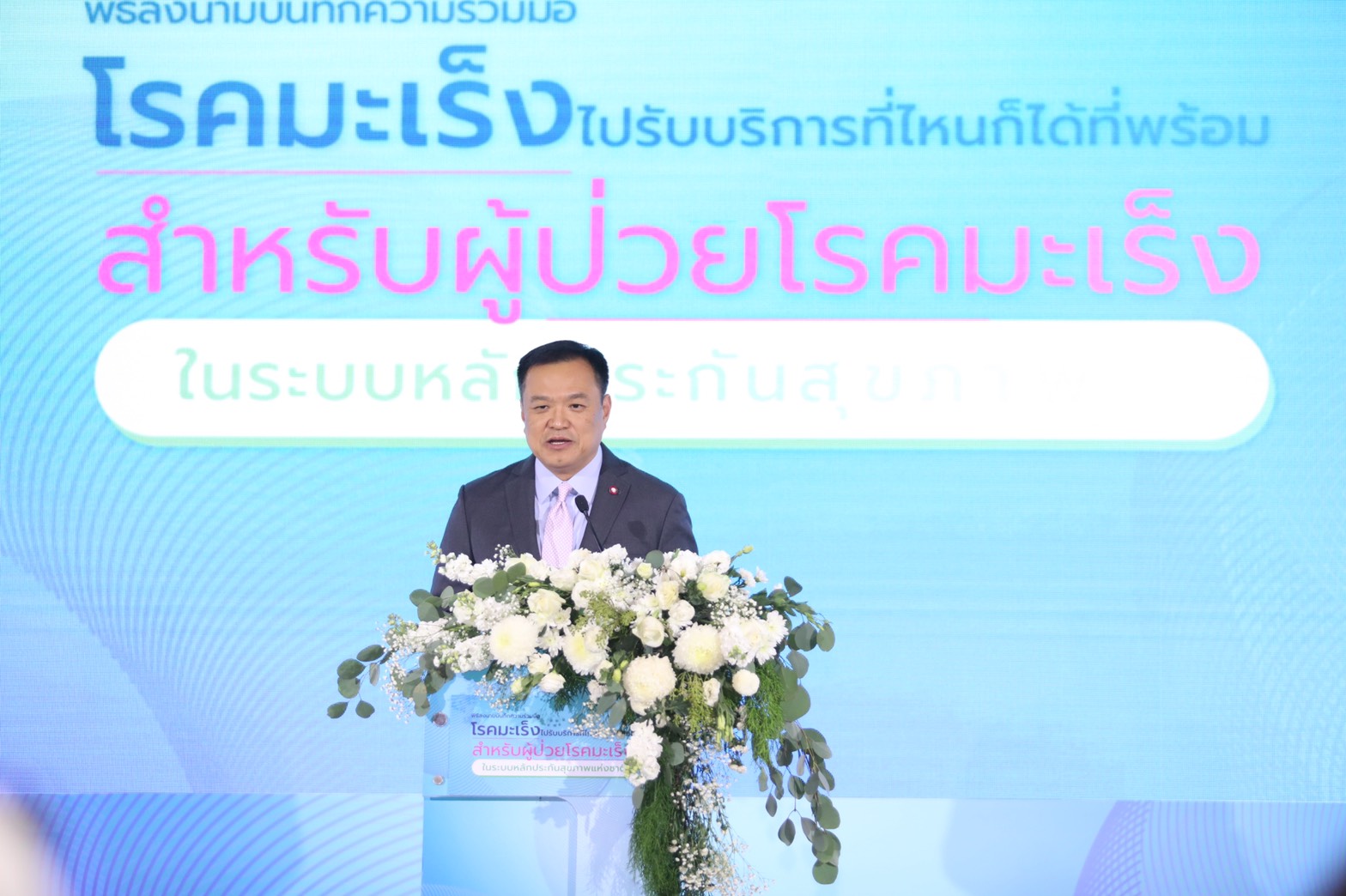
- Home
- DescriptionNews
Cancer care improved for UCS beneficiaries

Cancer care improved for UCS beneficiaries
Anutin Charnvirakul
Deputy Prime Minister of Thailand and the Minister of Public Health
Firstly, I wish you all safe and sound during the COVID-19 pandemic.
Thailand is facing a challenge from a new emerging wave since December last year. Though the pandemic will not come to an end soon, I believe all of us will get through this difficult time if each of us complies with health and social distancing measures, such as wearing face masks and washing hands regularly.
To control the spread of COVID-19, we have prepared necessary resources, including healthcare workers, medicines, and medical supplies. I can ensure that our public health staff is well-prepared, and they have committed to looking after everyone's health in Thailand. We will soon get vaccines from reliable sources, which gives us hope. We will surely depart from the years of living with the pandemic soon.
Along with curbing the coronavirus, we have continued upgrading the Universal Coverage Scheme (UCS) --- the Thai government’s healthcare scheme that provides healthcare access to 47 million people. We have recently enhanced health services under UCS in four points.
First, piloted in Bangkok, UCS beneficiaries can now access healthcare services in any designed primary care facilities regardless of their entitlement to their registering service unit.
Second, inter-hospital transfers have proceeded on a paperless system, which is piloted in Area Health region 9 in Northeastern Thailand.
Third, UCS beneficiaries can change their registering service unit within a day, instead of waiting for 15 days to get approvals from the hospital operators.
Fourth, patients with cancer can request treatment from any selected capable treated hospitals across Thailand instead of queuing up at their registering service unit.
I want to elaborate on the final point of the health services for cancer patients here.
Since the introduction of UCS in 2002, we have continually added treatment for high-cost diseases into the benefits package, including HIV/AIDS, kidney failure, and cancer.
We have focused on expanding the coverage of the benefits in the past years, and we should take a step further to address the quality and efficiency of the health services included in these benefits. One of those is cancer treatment.
Cancer is a killer disease that kills 80,665 people in Thailand annually. More than 122,000 new patients are diagnosed with cancer each year.
The cancer treatment is very costly and can push the patients' families into bankruptcy. Their time is consumed by a lengthy treatment process, undermining both patients' and their families' physical and mental health.
Despite the provision of cancer care by UCS, patients have experienced a long wait time for getting the treatment partly because there is a limited number of doctors and machines for radiation therapy and chemotherapy.
Most importantly, patients under UCS can only request free cancer treatment from the hospitals they register with. If those hospitals lack cancer specialists and equipment, patients will be transferred to the other hospitals and put on a waiting list for getting treatment.
They may reach a final stage of cancer before receiving are. We figure out that the key to reducing the cancer death rate is to get patients into treatment soon after diagnosed.
Therefore, we came up with an idea to set a new condition for patients with cancer. They can request treatment from any hospital without going through time-consuming inter-hospital transfers.
"Any hospital" means any health unit that provides cancer treatment and is under the contracts to National Health Security Office (NHSO), which oversees UCS.
Once a patient is diagnosed with cancer, he/she can consult with the doctor's team and request treatment at his/her preferred hospital. Health staff will then analyze the capacity and patients' waiting lists of that hospital and refer a patient there as quickly as possible. Everything is done on an electronic system.
Currently, public health ministry run 36 radiation therapy center and 164 chemotherapy center across the country.
Moreover, having sufficient equipment for cancer care is as important as reducing waiting time for patients.
The deputy public health minister and I are proud to announce that we successfully obtained the government funding to purchase seven radiation machines and distributed them to health units across Thailand's regions.
Though each machine cost around 100 million baht, Prime Minister Gen Prayut Chan-o-cha did not hesitate to approve to buy it. So do the cabinet members and the Office of the National Economic and Social Development Council, which responded to our funding request. This shows that they prioritize the health of people.
Moreover, I recently had a chance to visit Ramathibodi Hospital and learned about the home chemotherapy program run by health staff.
This program concerns the hardship of cancer patients who need to admit at hospitals and stay away from their home. With assistance from hospital staff, the programs allow patients to receive cancer care and remain with their loved ones at home, improving their mental health and recovering faster.
So far, seven hospitals have provided home chemotherapy programs, such as Ramathibodi Hospital, National Cancer Institute, Rajavithi Hospital, Somdech Phra Pinklao Hospital, Chulabhorn Hospital, Chonburi Cancer Hospital, and Lopburi Cancer Hospital. More hospitals will provide a similar service in the future.
I must give credit to the Department of Health to do all coordination work for relevant parties, including the Public Health Ministry and the network of medical universities, and make the program happen. I must also thank NHSO for quickly respond to our policy and distribute the UCS budget to support the program.
We are confident that our effort will advance cancer services' standard and improve the patients' quality of life. Public Health Ministry and NHSO will always decide the policies that most benefit Thai people.
Their smiles and their heartening supports give value to our existence. We promise that we will keep enhancing the Thai health system, and we won't fail to perform this promise.

